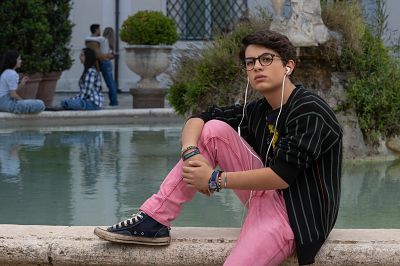
The Boy With Pink Trousers - Italian Film Festival
Click here if you liked this article 0 ![]()
https://italianfilmfestival.com.au/films
Date Reviewed: 25/09/2025
Some films grip you not with shock tactics but with the quiet accumulation of tenderness and tragedy. The Boy With Pink Trousers (Il ragazzo dai pantaloni rosa, 2024), directed by Margherita Ferri, belongs to this rare category. It is a memorial, an elegy, and a demand for remembrance. Loosely adapted from the true story of Andrea Spezzacatene and the book by his mother Teresa Manes, the film revisits the luminous but brief life of a boy whose pink trousers became both a symbol of individuality and a cruel target of bullying.
From the first scene, Ferri signals the weight of this story. A hospital room glows yellow — not golden, but harsh. Teresa (Claudia Pandolfi) cradles her newborn, as a voiceover interrupts: “I’d be 27 today.” The adult Andrea we will never see speaks from beyond, imagining the life he never lived. Flickering home videos and analogue textures follow: birthdays, piano lessons, seaside holidays. Andrea is not a statistic but a child who laughed, learned, and grew up amid both love and fracture.
Ferri thrives on such juxtapositions: happiness and sorrow, promise and rupture. Andrea (Samuele Carrino) is a prodigy, earning a scholarship that fills his mother with pride but only deepens his father’s (Corrado Fortuna) antagonism. Family fairs, ferris wheels, and nights by the sea are filmed with painterly warmth — yet behind closed doors, arguments splinter the household.
Andrea’s voice is his gift and vulnerability. At a choral audition, he locks eyes with Christian (Andrea Arru), a charismatic boy whose presence will define his adolescence. What begins as awe soon turns to desire, and then betrayal. Ferri captures the intensity of teenage longing with precision: Andrea pocketing Christian’s notes like relics, skipping movie nights with his loyal friend Sara (Sara Ciocca), absorbing every scrap of Christian’s attention. Their friendship is fraught, Andrea’s affection always at risk of being weaponised.
Then come the trousers. A gift from his mother, pale red until a laundry accident turns them unmistakably pink. At school, Andrea’s figure cuts through dull corridors like a flare. Sara calls him her idol. Christian smirks: “Nice pants. Do they make them for men too?” The comment lands as both ridicule and acknowledgement — and for Andrea, even that recognition matters.
The trousers mirror the world’s intolerance. To Andrea, they mean courage, individuality, resistance. To his peers, they excuse cruelty. Ferri uses colour with symbolic weight: yellow for anxiety, red for fracture, pink for exposure. The trousers shimmer as both armour and target, carrying the contradictions of teenage identity.
Cruelty crescendos at the Rose Ball. Believing Christian and his friends will dress up too, Andrea prepares with his mother’s help — eyeshadow shimmering, lipstick applied, wig brushed into place. It’s a moment of affirmation, a boy seeing himself as beautiful. The car ride brims with singing, as though joy might last. Instead, the night becomes a nightmare: Andrea cornered, filmed, dragged into the crowd as classmates laugh. Christian, once beloved, spits disgusting with venom. Ferri films it handheld, warped laughter amplifying the horror. The violence is not only physical but existential — a spectacle of erasure.
Yet Ferri resists reducing Andrea to suffering. She lingers on quiet moments: Andrea painting his nails, watching films with Sara, walking by the sea, imagining futures that will never come. “Being a teenager is enough suffering; you don’t need to be a poet,” he says — a line that encapsulates the film’s balance of poetry and plainness.
What makes The Boy With Pink Trousers so powerful is its refusal to sensationalise tragedy. Ferri honours Andrea’s subjectivity, keeping us close to his gaze. We feel his longing, his joy, his despair. Samuele Carrino gives a luminous performance — wide-eyed, tender, fragile. Claudia Pandolfi as Teresa brings equal force, her love so palpable it aches.
The conclusion devastates but never feels exploitative. Andrea narrates his final birthday: “my last day on earth was peaceful,” as candles glow on a cake. Later, Teresa types at her computer, tears streaming: “I made mistakes. But letting him wear those pants wasn’t one of them.” It is a line that distils the film’s power.
What lingers is not just Andrea’s suffering, but his radiance. Ferri does not martyr him; she restores his personhood. The pink trousers, once mocked, become a symbol of remembrance.
In a culture still rife with bullying and intolerance, The Boy With Pink Trousers feels urgent. Ferri has crafted a film both specific and universal, a portrait of adolescence, cruelty, and the hunger to belong. It is a reminder that representation matters — not as tokenism, but as a way of keeping lives from being forgotten.
Reviewed by Scarlet Thomas